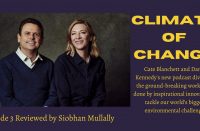I have a friend I’ll call Dave. An educated, rational and intelligent man, Dave can be counted on for thoughtful, reasoned arguments, except on one issue: climate change. He has read the overwhelming evidence, but Dave remains certain that climate change is a myth. His proof? He has none that hasn’t been dismissed repeatedly by climate scientists. Still, Dave remains steadfast and I could never understand why. Clive Hamilton may have given me the answer.
I have a friend I’ll call Dave. An educated, rational and intelligent man, Dave can be counted on for thoughtful, reasoned arguments, except on one issue: climate change. He has read the overwhelming evidence, but Dave remains certain that climate change is a myth. His proof? He has none that hasn’t been dismissed repeatedly by climate scientists. Still, Dave remains steadfast and I could never understand why. Clive Hamilton may have given me the answer.
The Australian National University public ethics professor’s book Requiem for a Species: Why We Resist the Truth About Climate Change is an excoriating account of how hubris and greed, distractions and obsessions have contributed to a pervasive refusal to accept the truth about our climate crisis. A riveting book, it is quite simply the best explanation I have read of humanity’s colossal failure to act in the face of an imminent threat to life on Earth.
Many books present grim climate facts while still holding out (or onto) hope. Hamilton is decidedly more pessimistic. “Even with a very optimistic assessment of the likelihood of the world taking the necessary action,” he writes, “catastrophic climate change is now virtually certain.”
How did it come to this? This is where Requiem sets itself apart. First, Hamilton takes aim at some usual suspects. He says that our “fetishization” of economic growth has become “a religious urge.” Even in the face of ruinous decline in the conditions of life on Earth, we “quibble over a decline in the economic growth rate of 0.2 per cent rather than 0.1 per cent.”
But there are also formidable psychological explanations for why we reject the truth. Due in large part to sophisticated marketing campaigns, Hamilton asserts, our modern identities are now intrinsically connected to our consumption habits. Attempting to persuade people like Dave to reduce what they consume becomes a challenge to “who we are.”
The human psyche is simply not well adapted to cope with long-term, existential threats such as climate change. By believing that scientists are exaggerating the risks or that there may still be time to find a solution, Hamilton says we are instinctively clinging to false hope in order to shield ourselves from a truth many of us find too difficult to bear. Meanwhile, right-wing media, think-tanks and corporate interests feed our rationalizations by attacking the science and plying the public with misinformation.
Dispiriting stuff. So what are we to do? The first step, says Hamilton, is to dispense with false hope. The latest science indicates that at least two degrees of warming is now unavoidable by 2100, and a barely-imaginable four degrees seems much more likely. “Hoping that a major disruption to the Earth’s climate can be avoided,” the author says, “is a delusion.”
Next is to take action. It may be too late to prevent climate change, but large investments in efficiency and renewable energy can still achieve drastic emission reductions. Indeed, Hamilton believes humanity faces a transformative opportunity to “change not only how we live but how we conceive of ourselves.” Seizing this opportunity, however, will require a new and radical mass movement to “build a countervailing power to the elites and corporations.”
Despair. Accept. Act. With these simple instructions, Requiem may well prove to be a seminal work in the fight for climate justice. Hamilton lucidly explains how the idea of climate change has come to be regarded as a profound threat because it represents a challenge to the way we see the world and our place in it. In other words, we’re all damned scared of what the future has in store – myself and Dave included.
Requiem for a Species, Clive Hamilton, London: Earthscan, 2010, 240 pages
This review originally appeared in EcoBooks, Issue 37.3. Subscribe now to get more book reviews in your mailbox!
Reviewer Information
Mark Brooks is a journalist, broadcaster and environmental educator. Follow him on Twitter: @earthgaugeCA.












